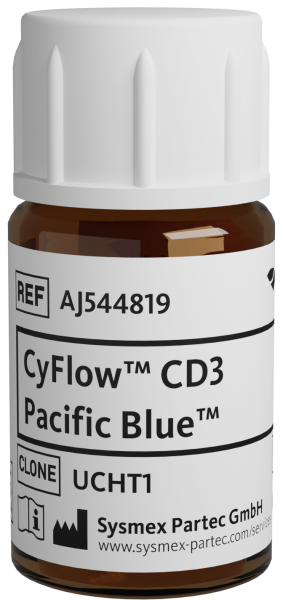CyFlow™ CD3 Pacific Blue™

| Alternative Name: | Leu4, T3 |
| Antigen: | CD3 |
| Application: | Flow cytometry |
| Clonality: | monoclonal |
| Clone: | UCHT1 |
| Emission Maximum: | 455 nm |
| Excitation Maximum: | 400 to 410 nm |
| Field of Interest: | Immunophenotyping |
| Format/Fluorochrome: | Pacific Blue™ |
| Isotype: | IgG1 |
| Laser: | Violet |
| Regulatory Status: | CE IVD |
| Source Species: | Mouse |
| Target Species: | Human |
| Product number: | AJ544819 |
CE IVD
| HLDA Workshop | HLDA I—WS Code T 3 HLDA III—WS Code T 126 HLDA III—WS Code T 471 HLDA VI—WS Code T 6T-CD3.1 |
| Concentration Unit | µg/mL |
| Concentration | 100 |
| Quantity | 100 tests |
| Volume | 1.0 mL |
| Immunogen | Human thymocytes followed by Sezary T cells |
| Background Information | CD3 complex is crucial in transducing antigen-recognition signals into the cytoplasm of T cells and in regulating the cell surface expression of the TCR complex. T cell activation through the antigen receptor (TCR) involves the cytoplasmic tails of the CD3 subunits CD3γ, CD3 δ, CD3ε and CD3ζ. These CD3 subunits are structurally related members of the immunoglobulins superfamily encoded by closely linked genes on human chromosome 11. The CD3 components have long cytoplasmic tails that associate with cytoplasmic signal transduction molecules. This association is mediated at least in part by a double tyrosine-based motif present in a single copy in the CD3 subunits. CD3 may play a role in TCR-induced growth arrest, cell survival and proliferation. The CD3 antigen is present on 68-82% of normal peripheral blood lymphocytes, 65-85% of thymocytes and Purkinje cells in the cerebellum. It is never expressed on B or NK cells. Decreased percentages of T lymphocytes may be observed in some autoimmune diseases. |
| Antigen Distribution | CD3 (T3, Leu4) is expressed on peripheral blood lymphocytes, thymocytes and Purkinje cells in the cerebellum; it is lost on B or NK cells. CD3 complex is crucial in transducing antigen-recognition signals into the cytoplasm of T cells and in regulating the cell surface expression of the TCR complex. T cell activation through the antigen receptor (TCR) involves the cytoplasmic tails of the CD3 subunits CD3γ, CD3δ, CD3ε and CD3ζ. |
| Usage | CE IVD usage Placeholder |
| Storage Buffer | The reagent is provided in stabilizing phosphate buffered saline (PBS) solution, pH ≈7.4, containing 0.09% (w/v) sodium azide and 0.2% (w/v) BSA. |
| Storage | Avoid prolonged exposure to light. Store in the dark at 2-8°C. Do not freeze. |
| Stability | Do not use after expiration date stamped on vial label. |
| Garson JA, Beverley PC, Coakham HB, Harper EI: Monoclonal antibodies against human T lymphocytes label Purkinje neurones of many species. Nature. 1982 Jul 22; 298(5872):375‑7. < PMID: 6178042 > | McMichael AJ, Beverley PCL, Cobbold S, et al (Eds): Leucocyte Typing III, White Cell Differentiation Antigens. Oxford University Press, Oxford. 1987; 1‑1050. < NLM ID: 8913266 > | Fisch P, Malkovsky M, Braakman E, Sturm E, Bolhuis RL, Prieve A, Sosman JA, Lam VA, Sondel PM: Gamma/delta T cell clones and natural killer cell clones mediate distinctpatterns of non‑major histocompatibility complex‑restricted cytolysis. J Exp Med. 1990 May 1; 171(5):1567‑79. < PMID: 2185329 > | Barclay, Brown, et al.: The Leukocyte Antigen FactsBook; 2nd edition. Harcourt Brace & Company, London. 1997; < No PMID > | Kishimoto T, Goyert S, Kikutani H, Mason D, Miyasaka M, Moretta L, Ohno T, Okumura K, Shaw S, Springer TA, Sugamura K, Sugawara H, von dem Borne AEGK, Zola H (Eds): Leucocyte Typing VI. Garland Publishing Inc, New York. 1997; 1‑1342. < NLM ID: 9712219 > | le Gouvello S, Manceau V, Sobel A: Serine 16 of stathmin as a cytosolic target for Ca2+/calmodulin‑dependent kinase II after CD2 triggering of human T lymphocytes. J Immunol. 1998 Aug 1; 161(3):1113‑22. < PMID: 9686569 > | Torres PS, Alcover A, Zapata DA, Arnaud J, Pacheco A, Martín-Fernández JM, Villasevil EM, Sanal O, Regueiro JR: TCR dynamics in human mature T lymphocytes lacking CD3 gamma. J Immunol. 2003 Jun 15; 170(12):5947‑55. < PMID: 12794121 > | Huang Y, Wange RL: T cell receptor signaling: beyond complex complexes. J Biol Chem. 2004 Jul 9; 279(28):28827‑3. < PMID: 15084594 > | Arnett KL, Harrison SC, Wiley DC: Crystal structure of a human CD3‑epsilon/delta dimer in complex with a UCHT1 single‑chain antibody fragment. Proc Natl Acad Sci USA. 2004 Nov 16; 101(46):16268‑73. < PMID: 15534202 > | Demedts IK, Brusselle GG, Vermaelen KY, Pauwels RA: Identification and characterization of human pulmonary dendritic cells. Am J Respir Cell Mol Biol. 2005 Mar; 32(3):177‑84. < PMID: 15576669 > | Lin CW, Liu TY, Chen SU, Wang KT, Medeiros LJ, Hsu SM: CD94 1A transcripts characterize lymphoblastic lymphoma/leukemia of immature natural killer cell origin with distinct clinical features. Blood. 2005 Nov 15; 106(10):3567‑74. < PMID: 16046525 > | Kuhns MS, Davis MM, Garcia KC: Deconstructing the form and function of the TCR/CD3 complex. Immunity. 2006 Feb; 24(2):133‑9. < PMID: 16473826 > | Alarcón B, Swamy M, van Santen HM, Schamel WW: T‑cell antigen‑receptor stoichiometry: pre‑clustering for sensitivity. EMBO Rep. 2006 May; 7(5):490‑5. < PMID: 16670682 > | Rieux-Laucat F, Hivroz C, Lim A, Mateo V, Pellier I, Selz F, Fischer A, Le Deist F: Inherited and somatic CD3zeta mutations in a patient with T‑cell deficiency. N Engl J Med. 2006 May 4; 354(18):1913‑21. < PMID: 16672702 > | Siegers GM, Swamy M, Fernández-Malavé E, Minguet S, Rathmann S, Guardo AC, Pérez-Flores V, Regueiro JR, Alarcón B, Fisch P, Schamel WW: Different composition of the human and the mouse gammadelta T cell receptor explains different phenotypes of CD3gamma and CD3delta immunodeficiencies. J Exp Med. 2007 Oct 29; 204(11):2537‑44. < PMID: 17923503 >
